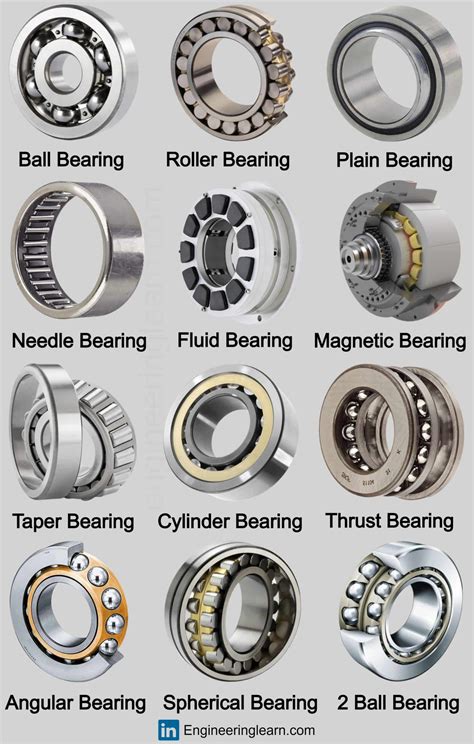Bearings: The Foundation of Modern Machinery
Bearings play a crucial role in modern machinery and infrastructure, enabling smooth movement and reducing friction. They are essential components in various applications, ranging from wind turbines to medical devices, and stand for approximately 80% of all machinery components.
Understanding Bearings
Bearings are mechanical devices that allow components to rotate or move relative to each other with minimal friction. They consist of two primary elements:
-
Inner Race: Attached to the rotating shaft or component.
-
Outer Race: Attached to the stationary housing or frame.
Types of Bearings:

Bearings come in various types, each designed for specific applications and requirements. Some common types include:

-
Ball Bearings: Utilize small, rolling balls as a contact surface.
-
Roller Bearings: Use cylindrical or tapered rollers for contact.
-
Linear Bearings: Provide linear motion instead of rotational motion.
-
Hydrostatic Bearings: Utilize a thin film of pressurized fluid to create frictionless motion.
-
Magnetic Bearings: Suspend components using magnetic forces, eliminating friction entirely.
Why Bearings Matter
Bearings play a vital role in machinery performance and efficiency:
-
Reduce Friction: Bearings minimize friction between moving parts, increasing efficiency and reducing energy consumption.
-
Extend Equipment Life: By minimizing wear and tear, bearings prolong the lifespan of machines and reduce maintenance costs.
-
Improve Performance: Precision bearings ensure smooth and accurate movement, enhancing machine accuracy and productivity.
-
Reduce Vibration: Bearings absorb and dampen vibrations caused by moving parts, ensuring quiet operation and protecting sensitive components.
Benefits of Using High-Quality Bearings
Investing in high-quality bearings offers numerous benefits:
-
Enhanced Reliability: Reliable bearings reduce unexpected downtime and improve system availability.
-
Increased Efficiency: Precision bearings minimize friction and energy losses, leading to higher efficiency and cost savings.
-
Extended Service Life: Durable bearings withstand wear and tear, extending service intervals and reducing maintenance costs.
-
Improved Safety: Well-maintained bearings prevent machine failure and reduce safety risks.
Comparison of Bearing Types
| Bearing Type |
Rolling Element |
Contact Type |
Load Capacity |
Speed Capabilities |
| Ball Bearings |
Balls |
Point |
Low to Moderate |
High |
| Roller Bearings |
Cylinders or Tapers |
Line |
High |
Moderate |
| Linear Bearings |
Linear Bushings or Slides |
Linear |
Moderate |
High |
| Hydrostatic Bearings |
Pressurized Fluid Film |
Fluid |
Ultra High |
Low to Moderate |
| Magnetic Bearings |
Magnetic Forces |
Magnetic |
Very High |
Ultra High |
Tips and Tricks for Bearing Maintenance
-
Proper Lubrication: Ensure regular lubrication to reduce friction and extend bearing life.
-
Regular Cleaning: Remove dirt and contaminants to prevent buildup and premature failure.
-
Visual Inspection: Regularly check bearings for signs of wear, damage, or misalignment.
-
Periodic Inspection: Schedule routine inspections to detect and address potential issues before they escalate.
-
Proper Storage: Store bearings in a clean and dry environment to prevent corrosion.
How to Replace Bearings Step-by-Step
Replacing bearings involves careful attention to detail:
-
Identify the Bearing: Determine the type and size of bearing required for replacement.
-
Remove the Old Bearing: Use appropriate tools to safely remove the old bearing.
-
Prepare the Bearing Seat: Clean and inspect the bearing seat to remove debris or damage.
-
Lubricate the New Bearing: Apply a suitable lubricant to the new bearing before installation.
-
Install the Bearing: Carefully place the new bearing into the bearing seat.
-
Tighten the Bearing: Use appropriate tools to tighten the bearing accordingly.
-
Test the Bearing: Verify that the bearing is properly installed and operating smoothly.
Call to Action
The maintenance and replacement of bearings are essential for ensuring optimal machine performance and preventing costly downtime. By following best practices and investing in high-quality bearings, businesses can reap the benefits of improved efficiency, reliability, and safety. Contact your trusted bearing supplier today to discuss your specific requirements and explore solutions tailored to your needs.

